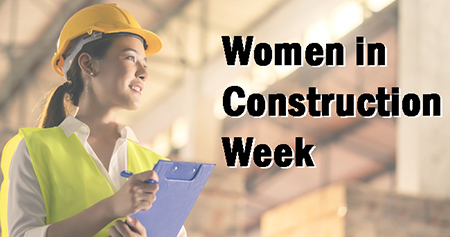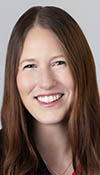|
Subscribe / Renew |
|
|
Contact Us |
|
| ► Subscribe to our Free Weekly Newsletter | |
| home | Welcome, sign in or click here to subscribe. | login |
Construction
| |
 |
March 4, 2024
Women at Skanska hold industry's 'keys to the future'
Skanska

Geller
|
The construction industry is evolving. Today, we see more and more women at the forefront of this traditionally male-dominated industry, steering us into a more gender-inclusive future. Since 2010, the number of women in construction across the United States has grown by nearly 53%. While a notable increase, significant barriers remain on the path to a more equitable future, as today women represent just 10.4% of the overall industry.
At Skanska in Seattle, Courtney Fraga, Michelle Petterson and Mary Fialko are helping break those barriers by redefining roles, shattering stereotypes, and championing diversity. Working across Skanska's three business sectors — Building Construction, Civil Construction and Commercial Development — each of these women boast unique roles including supplier diversity manager, project manager, and director of real estate development. While their jobs vary in scope, they all share an important commonality: They are keys to a future where the construction industry knows no gender boundaries.
Ahead of Women in Construction Week, I asked Courtney, Michelle, and Mary to reflect on their journey throughout the industry and their vision for a more inclusive workplace.
Q: What is your role at Skanska and what projects are you working on?
Courtney (Skanska USA Building): In my current role as supplier diversity manager, I focus on enhancing opportunities for diverse subcontractors and suppliers while actively engaging with our diverse business community to support their success across our projects in the Seattle office.

Michelle (Skanska USA Civil): As a project manager overseeing Skanska's heavy-civil infrastructure projects in the Pacific Northwest, my responsibilities revolve around orchestrating the planning and overall execution process on our projects. I am currently focused on the I-405 Brickyard Interchange Improvement project where I oversee the development of the construction schedule (and) evolving project dynamics, ensuring the team works collaboratively throughout the project lifecycle.
Mary (Skanska USA Commercial Development): As director of real estate development, I oversee the financial performance of multiple projects including The Eight, a 25-story, Class A-plus office tower located in Bellevue, and a project we're in the early design stages of right next door at Northeast Ninth Place and 106th Avenue Northeast. Additionally, I provide support for significant transactions within our portfolio.
Q: How has the industry evolved in terms of gender diversity and inclusion since you began your career?
Michelle: There has been a noticeable shift in the inclusion of women in day-to-day project discussions and in the comfortability to speak up. Prior to this, women had their voices “backed-up” by male counterparts and this change reflects a growing recognition of the value that women bring to the table in the decision-making process.
Courtney: Representation has changed significantly over time. Initially, being one of the only women in engineering school and on my teams was intimidating. Now, I see project teams led by all women. This change, especially post-George Floyd, has influenced a significant shift in initiatives toward D&I efforts making a difference. More ideas are welcome, more conversations are happening, and with comfort in sharing our opinions, especially people of color and women in the industry, diversity of thought is winning, and new perspectives are heard.

Q: What strategies do you believe are most effective in breaking down the barriers that deter women from pursuing careers in construction, and how can companies implement these strategies?
Mary: To foster true inclusivity, companies must first acknowledge the diverse challenges women encounter throughout their careers and then adapt their approach accordingly. While adhering to general standards is important, flexibility is essential to accommodate the varying needs of female employees for retention. Mentorship across genders is vital for young men to learn from women in leadership and for young women to see their potential future paths.
Courtney: My journey into construction came about due to my early exposure to the industry and the realization that it was an option for me. I believe investing in youth in construction can help them explore future career paths, particularly for women interested in engineering and construction. Programs like Camp BuildHER and ACE Mentorship create representation and enthusiasm for a more gender-inclusive future.
Q: What have you considered your “keys to success” in excelling in the construction industry?

Courtney: My keys to success stem from one of my all-time favorite books “The Four Agreements” by Don Miguel Ruiz. It had a profound impact on me during a pivotal moment in my life when I needed to regain control. They include: 1. Be impeccable with your word. 2. Do not take anything personally. 3. Do not make assumptions. 4. Always do your best.
Michelle: My key to success has been recognizing that you can't change others. We can foster personal growth and reflect on how our behavior influences outcomes and different reactions. One must also make sure not to lose themselves. You can be successful exactly how you are if you listen to your gut.
Mary: My keys to success are my ability to see the big picture throughout a project lifecycle, while also paying attention to details — big and small. Additionally, transparent and proficient communication throughout is key.
Q: What do you hope for the future/next generation of women getting started in the construction industry today?
Michelle: Early in my career, I felt like I could never say no. This created a habit of being overworked and unintentionally enabled those around me to take advantage of that. Today, I know that many women across all industries still struggle with this — myself included. My key to success has been to learn when, where, and how to say no. I hope the future/next generation of women continue to create workplace cultures where women feel like they can set boundaries and not fear they will be seen differently.
Courtney: I hope they aren't afraid to try. If I learned one big thing while going to school for civil engineering, it's that it gave me the capacity to try many different roles. Additionally, know that your career is long — you can start in one place and easily shift to another if it doesn't fit. Construction is an ever-changing career. If it bores you or doesn't fit, try another role within construction. Find where your passion leads you and try it on!
Madeline Geller supports communications for Skanska in Seattle.
Other Stories:
- A Woman’s place is every place
- Paving the way: Our next generation of women construction leaders
- Local NAWIC chapter lines up events
- A myriad of opportunities for women in the trades


